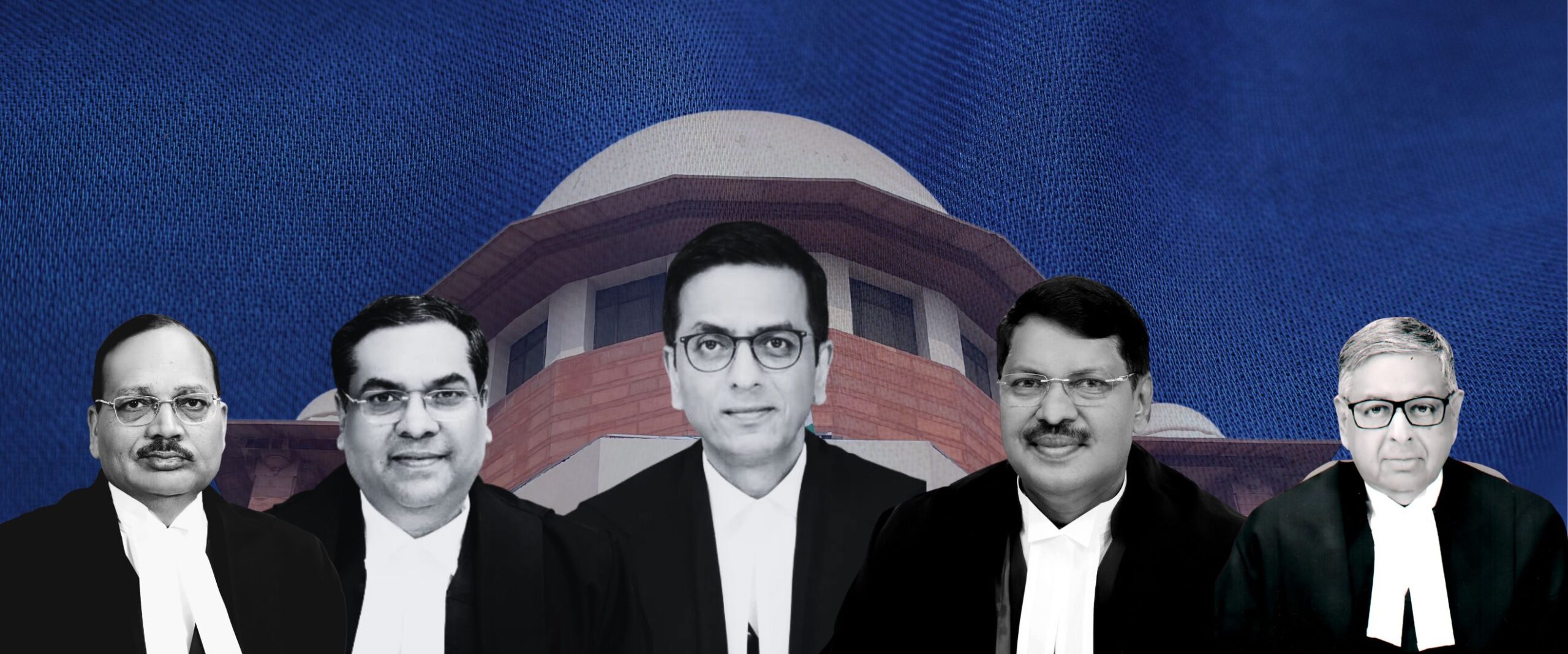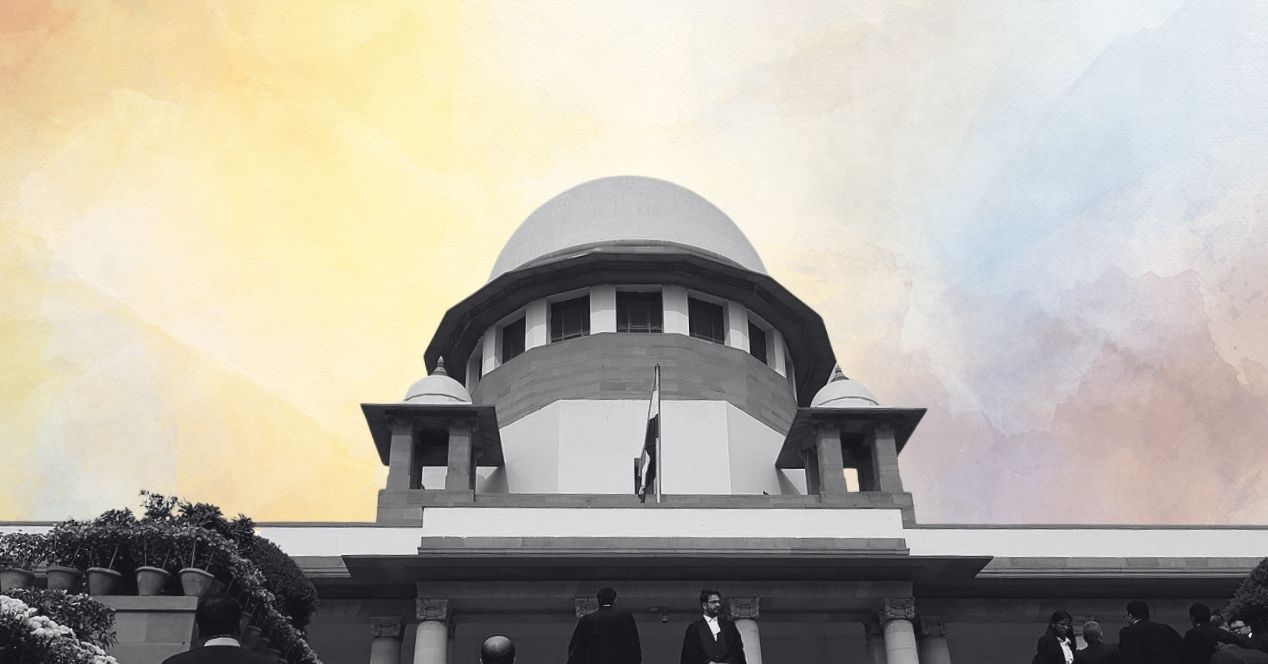Analysis
Contradictory Orders of the Calcutta High Court: Special Bench of the Supreme Court stays proceedings
The Special Bench comprising five seniormost judges of the Supreme Court will assemble on 29 January 2024 to hear the case on merits

Today, in a rare Saturday hearing, a Special Bench comprising five seniormost judges of the Supreme Court, Chief Justice D.Y. Chandrachud and Justices Sanjiv Khanna, B.R. Gavai, Aniruddha Bose along with Surya Kant joining online issued directions in a suo motu case tackling an unusual judicial crisis at the Calcutta High Court.
The hearing was the result of an extraordinary situation like never before. Two benches of the High Court issued conflicting orders on 24 and 25 January 2024, in the same case. The case concerns a petition alleging the issuance of fake caste certificates in West Bengal to secure medical admissions. Setting a rare precedent, a single-judge bench also issued an Order “ignoring” a Division Bench’s Order in the case on the premise of political bias, procedural drawbacks and legal misconduct. The central question before the Supreme Court revolves around the sanctity of judicial processes and the conduct of judges.
In the brief hearing today, the Special Bench issued notices to the parties involved and decided to hear the case again on Monday 29 January 2024. The Court also stayed all proceedings at the High Court till further notice.
Here’s everything you need to know about the case before the hearing on Monday.
Chaos at the Calcutta High Court: Order v Order
On 24 January 2024, a single-judge bench of the Calcutta High Court presided over by Justice Abhijit Gangopadhyay issued the first Order in this series of events. He directed the CBI to investigate the allegations of a petition claiming the issuance of fake caste certificates to gain medical admissions in the state.
Later that day, Kishore Datta, the Advocate General of the state mentioned the case before a Division Bench of Justices Soumen Sen and Uday Kumar. He contended that the petitioner in the case did not ask for a CBI inquiry. The Division Bench stayed the single-judge bench Order immediately.
A day later, Justice Gangopadhyay issued another Order ignoring the Division Bench Order. In his Order, he accused Justice Sen of “misconduct.”
“I have to do something which is though unusual but unless I do this I think I will fail in my duty to hold the sanctity of judiciary in general and this court in particular” he wrote in the order. He pointed out that the Division Bench Order came without an appeal memo and without producing the original Order before the Bench. In doing so, he said, the Division Bench had given a “very wrong signal” that such an appeal could be heard and an Order passed. He further pointed out that there was no cause of urgency shown for this speedy appeal. “In the said order I have not found any recording of any urgency in the matter. What was so urgent? Who is acting as an interested person for one of the political parties in the State?” he said.
These actions, the Order said amount to misconduct. “What Justice Sen has done today is to advance the cause of his personal interest to save some political party in power in this State. Therefore, his actions clearly tantamount to misconduct,” the Order said.
Allegations against Justice Sen
The Order also raised questions about Justice Sen’s political affiliations and judicial history. For instance, Justice Gangopadhyay narrates an incident in the Order when Justice Sen allegedly nudged Justice Amrita Sinha to not take action against Abhishek Banerjee, the General Secretary of the All India Trinamool Congress Party.
Further, a Supreme Court Collegium in a resolution dated 16 September 2021, had recommended the transfer of Justice Sen to the High Court of Orissa. Highlighting this, Justice Gangopadhyay’s Order questioned why this was not done yet. “Who are the persons behind him, who are saving him from such transfer whereby the order of the Supreme Court Collegium can be ignored…” he wrote.
For these reasons, Justice Gangopadhyay held that he had no option but to ignore the Division Bench Order and sought for it to be placed before the Chief Justice of India to be “relooked” if the Court thinks so.
Immediately after Justice Gangopadhay’s Order on 25 January 2024, the Chief took cognizance of the matter and on 26 January 2024, constituted a Special Bench comprising himself and four other seniormost judges of the Supreme Court to hear the matter. The Bench assembled the very next day—a Saturday to pass directions in the case.
The Order of the Supreme Court
Today, the five-judge bench convened for a little over 10 minutes to pass directions on the matter, with Justice Surya Kant appearing online.
Senior Advocate Kapil Sibal appeared for the State of West Bengal and informed the Bench that an appeal would be filed by them later today. Solicitor General Tushar Mehta expressed procedural concerns about the Division Bench Order and sought to file a note on the same.
The Bench held that all proceedings at the Calcutta High Court are stayed till further notice. Second, they decided to hear the case next on Monday 29 January 2024 and issued notice to the original petitioner in the case, the State of West Bengal and the CBI.
Interestingly, this is not the first time a Special Bench of the Supreme Court stayed proceedings in a case involving Justice Gangopadhyay.
In April last year, the top court had transferred a case from Justice Gangopadhyay following an interview of the latter to the press in which he spoke about the case. Following this, Justice Gangopadhyay passed an Order asking for the transcripts produced before the top court to be produced before him by midnight. However, a Special Bench of the Supreme Court convened later that evening to stay this order and held that “no further proceedings” would be held in that regard.
What are Special Benches?
The Supreme Court Handbook on Practice and Procedure defines a Special Bench as a Bench “constituted by or under the orders of the Chief Justice to hear a case or a particular class of cases.” Constitution of Special Benches is, therefore, a discretionary power of the Chief Justice exercised from time to time. Special Benches have been constituted in cases related to death references, land acquisition, taxes and most recently review against the Court’s 2022 PMLA judgement.
Over the years, the number of Special Benches sitting at the top court has seen a gradual increase. Last year’s annual report indicates that Special Benches were assembled 166 times between 2022 and 2023.
Though Special Benches are fairly common, their sitting on a Saturday is an anomaly. It has happened only a handful of times previously in urgent situations.
Special Bench Saturday: When did this happen in the past?
The gathering of benches on a non-working day of the Court is unusual but not unheard of. A five-judge bench of the Supreme Court delivered the famous verdict in the Ayodhya title dispute on Saturday 9 November 2019.
But Special Benches assembling for specific instances over the weekend has been scarce. In fact, this has happened less than 10 times since 2019. This particular instance stands out because not a single or Division Bench but a five-judge Bench of the Supreme Court sat to adjudicate the case after taking suo motu cognizance.
Previously, Special Benches of the Supreme Court have convened on Saturdays to tackle matters such as bail, political crisis, and criminal matters.
On Saturday 1 July 2023, a special bench of Justices B.R. Gavai, A.S. Bopanna, and Dipankar Datta stayed an Order of the Gujarat High Court which rejected the bail plea of activist Teesta Setalvad. Previously, Setalvad was granted interim bail by the Supreme Court in September 2022. In a night hearing, the three-judge bench led by Justice Gavai extended this interim protection till further notice. (Setalvad was later granted bail by the Supreme Court on 19 July 2023.)
On 3 June 2023, a vacation bench comprising Justices Sudhanshu Dhulia and Pankaj Mithal stayed an Order by a single judge of the Allahabad High Court to examine whether the woman who accused a person of rape is Manglik.
Before this, on Saturday 4 February 2023, a Bench of Justices V. Ramasubramanian and Hrishikesh Roy suspended a Calcutta High Court Order which directed the demolition of a building on which a contempt petition remained pending.
The other notable incident of a Saturday sitting was on 15 October 2022 during Chief Justice U.U. Lalit’s tenure. A Division Bench of the Supreme Court comprising Justices M.R. Shah and Bela Trivedi hurriedly suspended a Bombay High Court Order from the previous day acquitting scholar and activist Prof. G.N. Saibaba. Saibaba was arrested in 2014 for alleged links with maoists. In suspending the Order, the top court had reasoned that the High Court only focused on the procedural aspect of the investigation and did not consider the case on its merits.
Back in November 2021 when Justice N.V. Ramana was the CJI, a bench comprising the CJI with justices D.Y. Chandrachud and Surya Kant held a Saturday hearing to direct the Union government to undertake immediate “emergency measures” to address the rapidly worsening air quality in Delhi. The Bench suggested a two-day lockdown in Delhi. This special hearing was part of an ongoing case about air pollution from stubble burning.
Years before this, a bench of Justices N.V. Ramana, Ashok Bhushan and Sanjiv Khanna was constituted when Justice S.A. Bobde was the Chief. On 24 November 2019, the Bench sat after Shiv Sena, Congress and Nationalist Congress Party challenged the swearing-in of Devendra Fadnavis as Maharashtra Chief Minister a day before. Fadnavis was invited to form the government by the Governor of the state, Bhagat Singh Koshyari. However, the three parties had wanted Fadnavis to prove his majority in a floor test. The Court did not act on the plea that day but directed Solicitor General Tushar Mehta to supply all records of documents and communications about the invitation by the Governor.
On 20 April 2019, a special Saturday hearing took place after allegations of sexual harassment against then Chief Justice Ranjan Gogoi emerged. A three-judge bench comprising Justices Arun Mishra, Sanjiv Khanna and CJI Gogoi himself sat for this urgent hearing. CJI Gogoi denied the charges as “wild” and “baseless” while also suggesting a “greater conspiracy” to delegitimise his office. To curb the wide reporting of the allegation, Justice Mishra suggested that the media act with caution and “wisdom” while reporting on the case. The case drew widespread criticism given that CJI Gogoi sat on the bench to discuss his own sexual harassment allegations.
After a quick look at these instances, it appears that there are no rules or guidelines for the CJI’s power to constitute Special Benches—it is a matter of pure discretion.
However, still, the case of Justice Gangopadhay’s Order stands out. This time, the Special Bench will address an extraordinary situation of conflicting Orders from different benches of the same High Court in the same case. At the heart of this, lies a question about judicial processes and adjudicating mechanisms. Can a larger bench of a High Court stay a smaller bench’s Order without a memorandum? Can the smaller bench then issue another Order ignoring the Division Bench’s decision? What are the consequences? The five seniormost judges of the Supreme Court are expected to look into these questions on this Monday.



